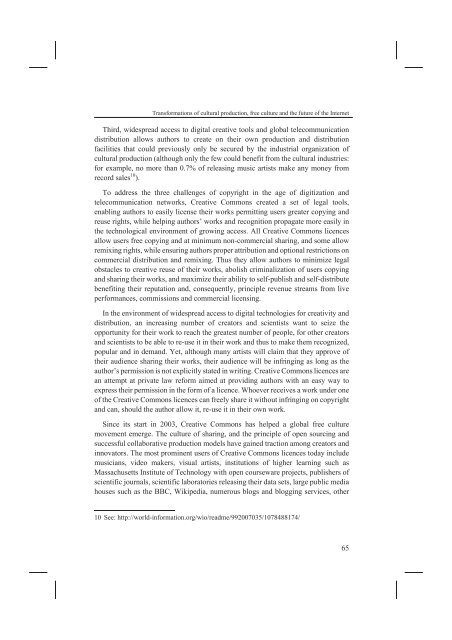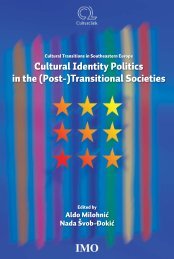D:\Documents and Settings\Ana\My Documents\Biserka-knjiga ...
D:\Documents and Settings\Ana\My Documents\Biserka-knjiga ...
D:\Documents and Settings\Ana\My Documents\Biserka-knjiga ...
Create successful ePaper yourself
Turn your PDF publications into a flip-book with our unique Google optimized e-Paper software.
Transformations of cultural production, free culture <strong>and</strong> the future of the Internet<br />
Third, widespread access to digital creative tools <strong>and</strong> global telecommunication<br />
distribution allows authors to create on their own production <strong>and</strong> distribution<br />
facilities that could previously only be secured by the industrial organization of<br />
cultural production (although only the few could benefit from the cultural industries:<br />
for example, no more than 0.7% of releasing music artists make any money from<br />
record sales 10 ).<br />
To address the three challenges of copyright in the age of digitization <strong>and</strong><br />
telecommunication networks, Creative Commons created a set of legal tools,<br />
enabling authors to easily license their works permitting users greater copying <strong>and</strong><br />
reuse rights, while helping authors’ works <strong>and</strong> recognition propagate more easily in<br />
the technological environment of growing access. All Creative Commons licences<br />
allow users free copying <strong>and</strong> at minimum non-commercial sharing, <strong>and</strong> some allow<br />
remixing rights, while ensuring authors proper attribution <strong>and</strong> optional restrictions on<br />
commercial distribution <strong>and</strong> remixing. Thus they allow authors to minimize legal<br />
obstacles to creative reuse of their works, abolish criminalization of users copying<br />
<strong>and</strong> sharing their works, <strong>and</strong> maximize their ability to self-publish <strong>and</strong> self-distribute<br />
benefiting their reputation <strong>and</strong>, consequently, principle revenue streams from live<br />
performances, commissions <strong>and</strong> commercial licensing.<br />
In the environment of widespread access to digital technologies for creativity <strong>and</strong><br />
distribution, an increasing number of creators <strong>and</strong> scientists want to seize the<br />
opportunity for their work to reach the greatest number of people, for other creators<br />
<strong>and</strong> scientists to be able to re-use it in their work <strong>and</strong> thus to make them recognized,<br />
popular <strong>and</strong> in dem<strong>and</strong>. Yet, although many artists will claim that they approve of<br />
their audience sharing their works, their audience will be infringing as long as the<br />
author’s permission is not explicitly stated in writing. Creative Commons licences are<br />
an attempt at private law reform aimed at providing authors with an easy way to<br />
express their permission in the form of a licence. Whoever receives a work under one<br />
of the Creative Commons licences can freely share it without infringing on copyright<br />
<strong>and</strong> can, should the author allow it, re-use it in their own work.<br />
Since its start in 2003, Creative Commons has helped a global free culture<br />
movement emerge. The culture of sharing, <strong>and</strong> the principle of open sourcing <strong>and</strong><br />
successful collaborative production models have gained traction among creators <strong>and</strong><br />
innovators. The most prominent users of Creative Commons licences today include<br />
musicians, video makers, visual artists, institutions of higher learning such as<br />
Massachusetts Institute of Technology with open courseware projects, publishers of<br />
scientific journals, scientific laboratories releasing their data sets, large public media<br />
houses such as the BBC, Wikipedia, numerous blogs <strong>and</strong> blogging services, other<br />
10 See: http://world-information.org/wio/readme/992007035/1078488174/<br />
65



